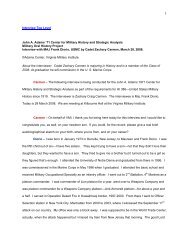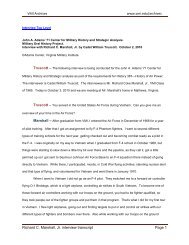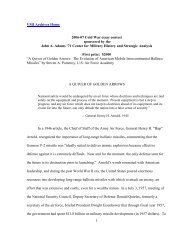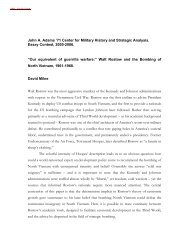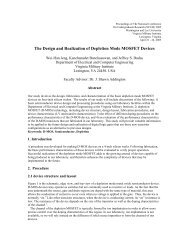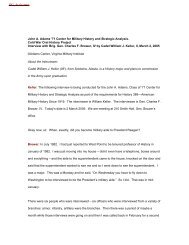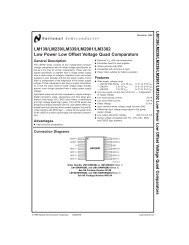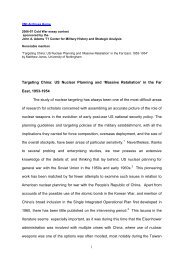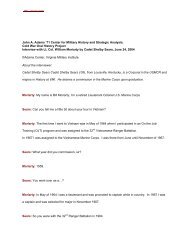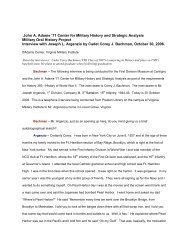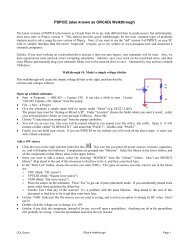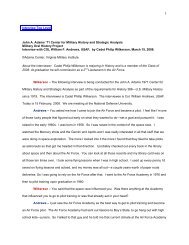Academic Catalog - Virginia Military Institute Admissions
Academic Catalog - Virginia Military Institute Admissions
Academic Catalog - Virginia Military Institute Admissions
You also want an ePaper? Increase the reach of your titles
YUMPU automatically turns print PDFs into web optimized ePapers that Google loves.
<strong>Virginia</strong> <strong>Military</strong> <strong>Institute</strong><br />
12-13 <strong>Catalog</strong>ue<br />
a clearer understanding of American intellectual history and how the great debates over<br />
the nature of the American regime have in fact played out, but will also consider the merits<br />
and demerits of the various claims being made. Readings will include Federalist and Antifederalist<br />
writings, Thomas Jefferson, Alexis de Tocqueville, John C. Calhoun, Abraham<br />
Lincoln, Edward Bellamy, John Dewey, Herbert Croly, and others.<br />
IS 441. CONSERVATIVE POLITICAL THOUGHT 3—0—3<br />
An examination of competing strains of thinking within conservatism organized around<br />
a series of debates. Some of the themes that will be covered include: the definition of<br />
conservatism, America as a propositional nation vs. a common culture, the aims of U.S.<br />
foreign policy, Lincoln’s America vs. the Old South, aristocratic vs. populist impulses,<br />
theories of jurisprudence, the purpose of the economic order, and the meaning of progress.<br />
.<br />
IS 442. LAW, MORALITY, AND POWER 3—0—3<br />
This course will examine the nature of law and the role that morality and power play in<br />
constituting the law. Is law fundamentally moral, discoverable by reason and necessarily<br />
conducive to the common good of society Or is law nothing more than the commands<br />
issued by whoever has the most power Do citizens have a moral obligation to obey the<br />
law, or are such claims, themselves, expressions of power When judges interpret the law,<br />
do they too have obligations, or must we simply expect them to act as agents of a particular<br />
social, political, and economic group These and other questions related to a deeper<br />
understanding of law and legal systems will be the focus of this course.<br />
IS 450. CRIMINAL LAW 3—0—3<br />
This course presents a general survey of substantive criminal law, that is the principles,<br />
theories, and important legal decisions defining criminal offenses and defenses. Substantive<br />
criminal law examines the conduct of the defendant. Time permitting; we may also delve into<br />
some procedural criminal law, which is based on the U.S. Supreme Court’s interpretations of<br />
the Bill of Rights. Criminal procedure evaluates the conduct of police and prosecutors. The<br />
course will utilize the casebook method of teaching favored by most law school courses.<br />
IS 451. CONSTITUTIONAL LAW 3—0—3<br />
This course presents a survey of the guiding principles of American Constitutional Law, with<br />
particular emphasis on landmark decisions of the United States Supreme Court interpreting<br />
the Bill of Rights. The class begins with the establishment of judicial review in 1803, but<br />
moves rapidly to the Court’s twentieth century jurisprudence. A substantial area of focus<br />
is constitutional criminal procedure – the Fourth, Fifth and Sixth Amendment decisions<br />
evaluating police conduct including methods of search and seizure and the interrogation<br />
of criminal suspects. Additional main topics include freedom of speech, religion, and the<br />
press according to the First Amendment, and Due Process of law and Equal Protection<br />
of the laws under the Fifth and Fourteenth Amendments. The course uses the casebook<br />
method of teaching favored by most law school courses. Class participation is important.<br />
IS 452. INTERNATIONAL LAW 3—0—3<br />
This course examines international law and its relationship to the practice of international<br />
politics. The course examines the sources of international law and its relationship to law<br />
within the state; the major players – the state, the UN and other IGO’s, natural and corporate<br />
individuals–and their attributes and capabilities. Some consideration is given to processes:<br />
diplomacy, treaties, arbitration, and adjudication. The final third of the course considers<br />
selected contemporary problem areas: the use of force, economic issues, protection of<br />
human rights, the environment. Two continuing themes throughout the course are: (1) how<br />
international law changes over time in response to changes in the international system; (2)<br />
how international law accommodates both justifiable claims and power realities.<br />
IS 460W. RESEARCH DESIGN FOR POLITICAL SCIENCE 3—0—3<br />
This course focuses on philosophies of and approaches to political science for facilitating<br />
cadets’ research objectives. The two central goals of the course are (a) to introduce cadets<br />
to the methods traditionally used to design, conduct, and report political science research;<br />
and (b) to allow cadets to apply these methods to their individual research questions. Cadets<br />
will frame research questions about politics, develop rigorous theories and hypotheses about<br />
politics, identify reasonable measures to test relationships, collect political data, develop<br />
a research design on a topic of their choosing that is acceptable by professional political<br />
scientific standards, and publicly present this research design. Prerequisites: a minimum<br />
grade of C in WR 102, IS 201, IS 301. Should be taken during the second semester of the<br />
second class year.<br />
IS 470-479. ADVANCED SPECIAL SEMINAR 3—0—3<br />
Upper-division elective seminars on special topics in politics as suggested from time to<br />
time by members of the faculty or groups of cadets.<br />
IS 480X: SCIENCE AND WAR 3—0—3<br />
In this civilizations and cultures designated course, cadets learn of scientific discoveries<br />
and inventions resulting in technologies that have changed the nature of warfare. They<br />
examine the potential of science to contribute to 21st century warfare with a current emphasis<br />
or terrorism and asymmetrical warfare. They study giants of the scientific or engineering<br />
establishments who have made extraordinary contributions to the ways wars are fought<br />
with particular emphasis on those who were not native-born Americans. They make a field<br />
trip to Washington DC.<br />
IS 490. INDEPENDENT STUDY 3—2—3<br />
Research and writing of a substantial paper on an approved topic, under the direction of<br />
International Studies faculty. Prerequisite: Permission of the department head.<br />
IS 491. READING FOR IS HONORS 3—0—3<br />
Cadets will develop an agenda of inquiry for the purpose of writing an original piece of<br />
political science research. To this end, cadets must, under the supervision of a faculty sponsor:<br />
choose an appropriate general topic; conduct in-depth reading in a selected subfield of<br />
political science; select an appropriate method of inquiry; and present and defend a formal<br />
research proposal. Prerequisite: Admission to the IS Honors Program.<br />
IS 492. WRITING FOR IS HONORS 3—0—3<br />
Cadets will write an original piece of political science research based on the preparation<br />
undertaken in IS 491.Specific requirements include: the completion of theoretical arguments or<br />
the execution of empirical hypothesis testing; scheduled draft and final paper submissions (to<br />
be accomplished in close consultation with a faculty sponsor); and a public oral presentation<br />
of the completed project. The successful completion of this course will result in the conferral<br />
of Department Honors. Prerequisite: Grade of B or better in IS 491.<br />
IS 493. INTERNATIONAL STUDIES SENIOR THESIS 3—0—3<br />
Research and writing of a substantial paper under supervision of a faculty sponsor. Oral<br />
examination by an ad hoc faculty committee. Open only to international studies majors.<br />
Prerequisite: Grade of B or better in IS 491 and IS 492.<br />
IS 494. PUBLIC SECTOR INTERNSHIP 1—4—3<br />
Cadets` work as interns with public-sector agencies, under the supervision of a member<br />
of the IS faculty in conjunction with officials from the agency involved. Course work will<br />
include readings, designing and carrying out of a suitable project with the agency, and<br />
preparation of a final paper and interview by supervising faculty. Open to first and second<br />
class IS majors. Prerequisite: permission of department head.<br />
INFORMATION TECHNOLOGY & Design<br />
DEPARTMENT OF MATHEMATICS AND COMPUTER SCIENCE<br />
DEPARTMENT head: ColONEl SIEMERS<br />
ITD 111. INTRODUCTION TO INFORMATION TECHNOLOGY 3—0—3<br />
This course is an introductory survey of the scope of information technology and design.<br />
This course provides an exposure and a foundation from which cadets can appreciate the<br />
relevance and interrelationships of future courses in the ITD minor. This course and the text<br />
follow a bottom-up arrangement of subjects from the concrete to the abstract. The course<br />
begins a discussion of techniques to analyze information needs. Next, we study basics of<br />
information encoding and computer architecture, and move on to the study of operating<br />
systems and computer networks. After that, we investigate the topics of algorithms,<br />
databases, programming, data structures, software development, human computer<br />
interaction, and computer graphics. We conclude with a brief overview of the history of<br />
information technology. Prerequisites: none.<br />
ITD 327. Telecommunications & Networking 3—2—4<br />
An intermediate level course discussing the background of history and networking and<br />
the Internet, network standards, OSI 7-layer model, TCP/IP, web technologies, and network<br />
security. Prerequisite: ITD 111. Credit will not be given for both ITD 327 and CS 327.<br />
ITD 343. Computer Forensics 3—0—3<br />
This course introduces cadets to the use of tools to extract information from a computer<br />
to fight crime and terrorism. The course examines legal issues such as the chain-of-custody<br />
for evidence, and ethical issues such as personal privacy. Related topics include an overview<br />
of computer and network forensics, computer concepts, network concepts, and network<br />
forensics. No previous knowledge of computer forensics or detailed workings of computer of<br />
networks assumed. Prerequisite: ITD 111. Credit will not be given for both ITD 343 and CS 343.<br />
ITD 345. Software Development and Management 3—0—3<br />
The software development process and life cycle: design and implementation, documentation<br />
and maintenance, verification and validation, CASE tools, and project management. Social<br />
and ethical issues faced by the computing professional. Course includes a collaborative<br />
team project with oral and written presentations. Prerequisite: ITD 111. Credit will not be<br />
given for both ITD 345 and CS 345.<br />
ITD 346. Human Computer Interaction 3 —0—3<br />
An introduction to theories and methods for developing and analyzing human-computer<br />
interactions. Students will be introduced to the use of graphic, audio, and haptic tools for<br />
design and implementation of computer interfaces. The course philosophy is user-centered<br />
design. Emphasis is on cognitive factors include information load and learning imposed on<br />
users, and modeling user behavior. Application of techniques to both web-based and more<br />
traditional user interfaces by implementing a prototype team project. Prerequisite: ITD 111.<br />
Credit will not be given for both ITD 346 and CS 346.<br />
ITD 347. Web Applications 3—0—3<br />
Analysis of systems and a survey of contemporary software tools and techniques for Web<br />
application development. Application development and user interface design for clientside<br />
and server-side web applications. Technologies include HTML, scripting languages,<br />
connecting to databases, and XML. Prerequisite: ITD 111 or CS 121 or instructor permission.<br />
ITD 348. Database Management and Information Retrieval 3—0—3<br />
Introduction to database management systems with emphasis on the relational model.<br />
Database system architecture, storage structures, access methods, relational model theory,<br />
98





